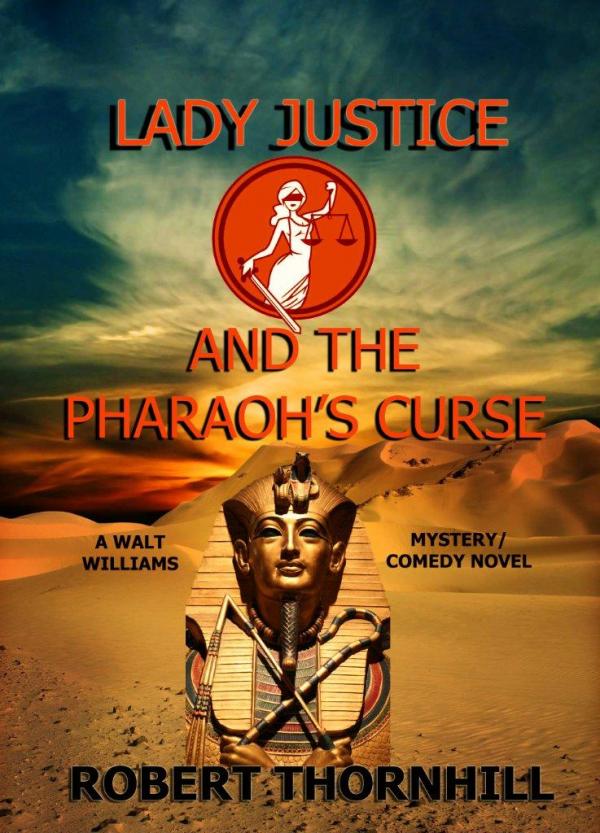| Lady Justice and the Pharaoh's Curse
Lady Justice and the Pharaoh's Curse

An artifact is stolen from the King Tut exhibit, setting in motion a string of bizarre murders
that baffle the Kansas City Police Department.
A local author simultaneously releases his novel, The Curse of the Pharaohs, attributing the deaths to an ancient prophesy, ‘Death shall come on swift wings to him who disturbs the peace of the King.’
Are the deaths the result of an ancient curse or modern day mayhem?
Follow the clues with Walt and decide for yourself!

Autographed Copy
$10.00 plus postage
PROLOGUE
Valley of the Kings
Egypt
1323 B C
Imhotep, a high priest in the court of Tutankhamun, Pharaoh of Egypt, took one last look at the vault that held the sarcophagus of his beloved boy king.
His craftsmen had spent months preparing the body of the king and the vessels that contained his vital organs, so that the Pharaoh could pass freely from this mortal life to the next.
His last remaining task was to seal the tomb with its gold and precious stones, and conceal it from the marauders, raiders and looters that roamed the desert hills.
He stood before the Anubis, the jackel-headed god that had been the protector and guardian of the pharaoh’s tombs for centuries.
Between the jackal’s paws, he placed a stone tablet inscribed with the words, “Death shall come on swift wings to him who disturbs the peace of the King.”
The Anubis stood guard in the dark tomb for more than three thousand years. Then one day, the tomb was opened -----
Lady Justice and the Pharaoh’s Curse
Kansas City, Missouri
2014
CHAPTER 1
Bernard Maloof pulled the dog-eared journal from under his mattress and carried it to the small dinette table in the kitchen.
Although he had read the journal dozens of times, he needed to read it one more time to reinforce the decision he was about to make. He knew that if he acted on the information he had found there, his life would be forever changed. There would be no turning back.
He took a moment to reflect on the events of the past year that had delivered the journal into his possession.
Bernie was just an ordinary guy living an ordinary life.
His parents had been killed in an auto accident. He was the sole beneficiary of a small life insurance policy and had used the money to enroll in the Metropolitan Junior College. After a year, the money ran out. He dropped out of school and found a job working on a custodial crew that cleaned office buildings at night.
The job paid enough to keep a roof over his head and food on the table, but little else.
Then one day, he received the call that would change the course of his life. It was from an attorney in Cleveland, Ohio. His uncle, Nasser Maloof, had passed away. Bernie, his only living relative, had been named executor of the estate. Nasser’s will had also designated him as the beneficiary. The call was to see if Bernie was available to come to Cleveland to settle his uncle’s affairs.
Bernie knew very little about his uncle other than that he was a skilled craftsman and artisan. In 2003, Nassar had been contacted by Dr. Mostafa El-Ezaby, one of the most prestigious sculptors in Cairo, Egypt. Dr. El-Ezaby was putting together a team of craftsmen whose task would be to replicate the vast collection of treasures discovered in the tomb of King Tutankhamun by Howard Carter in 1922. Since the original treasures were no longer permitted to leave Egypt, the goal was to replicate a thousand of the most significant artifacts from the collection which would be presented on a world tour. Nasser Maloof had been invited to become a member of the team.
The timing could not have been worse. Nasser’s wife, Anat, was too ill to make the journey to Egypt. Realizing that this was a great honor for her husband, Anat encouraged him to go and moved into a private nursing facility.
The decision enraged Bernie’s father, Rashidi, who believed that family was more important than prestige. Nasser had been gone for almost a year when Anat passed away --- alone. Rashidi had not spoken to his brother from that day until he perished in the auto accident.
Bernie took a leave of absence from his job and headed to Cleveland hoping that his uncle’s estate would put him back on his feet financially so that he could continue his schooling. He couldn’t have been more mistaken.
Without insurance, the monthly fees for the nursing facility soon drained their meager savings account. Nasser mortgaged their home so that Anat could get the care she needed.
Instead of a tidy nest egg, Bernie found a stack of unpaid bills and a house mortgaged to the hilt. When it was all said and done, Bernie had just enough money for gas back to Kansas City.
Two days before his departure, he had been boxing up clothing, dishes and other household items for the Salvation Army. That’s when he found a metal canister in the back of the closet. The journal, which he had just opened on his dinette table, was tucked away in the canister.
Weary from his labors, he had taken a break to examine the journal. It appeared to be a diary of sorts, a day-by-day account of Nasser’s work replicating the artifacts from King Tut’s tomb. Much of the narrative was of a technical nature and beyond Bernie’s comprehension. He was soon bored with the technical stuff, but he kept reading because interspersed were Nasser’s personal feelings about how the work was progressing. Nasser was quite articulate and as Bernie read, he found himself fascinated by this family member he barely knew.
The early entries were positive and optimistic, but as time went on, Bernie could sense a change in the tone of the entries. Although Nasser loved the work he was doing, it was obvious that he was missing his home and burdened with guilt having left his wife in her time of need.
Nasser’s entry about the death of his wife brought tears to Bernie’s eyes. The anguish and remorse that Nasser felt was heartbreaking.
It was at that point that the tone of the entries changed again, from somber and reflective to bitter and vengeful. He now saw his work as the culprit in his financial demise and the abandonment of his family.
Following the account of his wife’s death, the entries in the journal were no longer about an artisan proud of his work, but about a clever plot to exact revenge on the entity that had ruined his life.
Bernie had deduced that his uncle’s work involved taking epoxy resins, plaster, and original materials such as wood, stone, and gold leaf to make the replicas, instead of using the solid gold and precious stones of Tutankhamun's day. Nevertheless, over 5,000 original artifacts were at his fingertips on a daily basis as models for the replicas.
Bernie read with fascination his uncle’s account of his final task on the team --- the replication of Anubis, the protector of Tutankhamun’s tomb.
One entry read, “The statue of the Anubis, depicted completely in animal form was attached to the roof of the shrine. The jackal lying on the shrine is made from wood, covered with black paint. The insides of the ears, the eyebrows and the rims of the eyes of the reclining animal are worked in gold leaf as well as the collar and the band knotted around the neck. The whites of the eyes are made from calcite and the pupils from obsidian. The claws are in silver, which was more valuable than gold in Ancient Egypt.
“I shall replicate the Anubis in every detail with one exception, the belly of the beast shall be hollowed out to accommodate the gold and precious stones which I will take from various artifacts over a period of time. Given the vastness and the age of the collection, the purloined items will never be missed.”
The remaining entries in the journal detailed the items that Nasser had removed from the original artifacts, an emerald here, a ruby there, a bit of gold or silver from somewhere else. Everything was hidden in the hollowed belly of the Anubis and finally sealed.
The last entry in the journal read, “My task is complete. While no amount of riches can bring back my beloved Anat or assuage the torment that I feel, I have, at the very least, struck a blow against the ghost that pulled me away from my family. These riches from the pharaoh’s tomb shall remain hidden until such time as I or a member of my family can claim them.”
Bernie was dumbfounded. If what he had just read was true, and he had no reason to believe it wasn’t, somewhere out there was an artifact filled with gold, silver and precious stones and he was the only person in the world that knew of its existence.
During the long drive back to Kansas City, he replayed the journal entries over and over in his mind.
What his uncle had done reminded him of the old Johnny Cash song, One Piece at a Time. It was about a guy that worked on the assembly line at General Motors building Cadillac’s. The guy had always wanted one but knew he couldn’t afford one, so he devised a plan to steal one piece at a time over a period of years.
One verse said, “I’ve never considered myself a thief, but GM wouldn’t miss just one little piece, especially if I strung it out over several years.”
In the end he put all the parts together from 1949 to 1970 and had one “Psyco-Billy Cadillac!”
Bernie couldn’t wait to get home and research the tour which had been named,
The Discovery of King Tut
His Tomb * His Treasures
The Breathtaking Recreation
He was delighted to discover that the traveling exhibit was to be at Union Station in Kansas City in the near future.
He had to get close to that exhibit and he figured out just the way to do it.
Once back home, he made several trips to Union Station and discovered that many of the exhibits were manned by volunteers. He went to the Union Station website and clicked on the tab, ‘Volunteers.’ He read about becoming part of the team and clicked on the tab, ‘Click here to join now.’
His night job with the cleaning company gave him his days free to volunteer at Union Station.
That was three months ago. Since then, he had become a regular, spending every free minute volunteering and sucking up to the guy in charge. It had paid dividends. He had been assigned to the King Tut exhibit.
He had helped unload the crates from the tractor-trailer rigs, helped clean the massive rooms that would house the exhibit and even gotten to help assemble the exhibit before opening day.
He vividly remembered seeing the Anubis for the first time. It was everything he expected. It was beautiful. It was breathtaking. It was ferocious. It had been created by his uncle and as he stood there looking into the obsidian eyes, he knew that inside the black belly was a treasure that would soon be his.
|